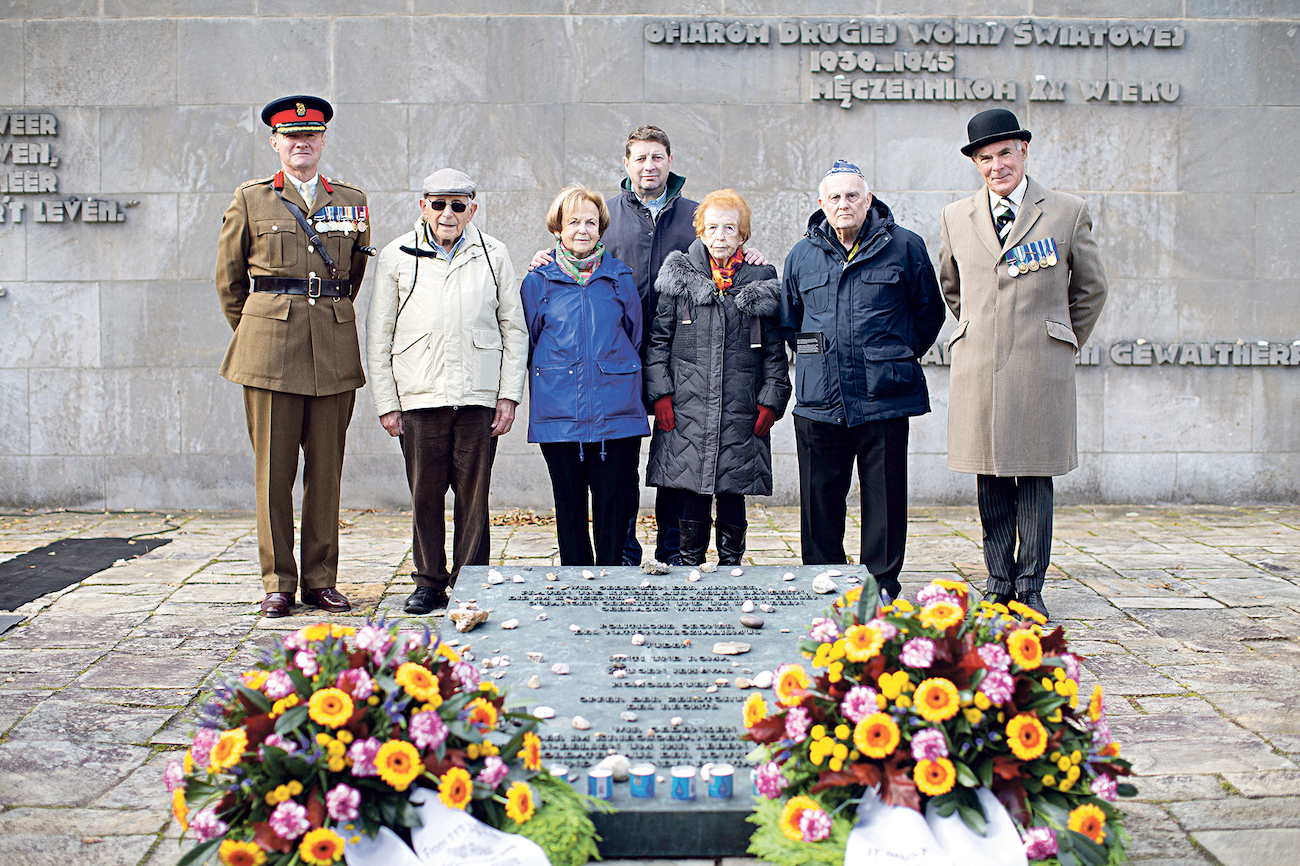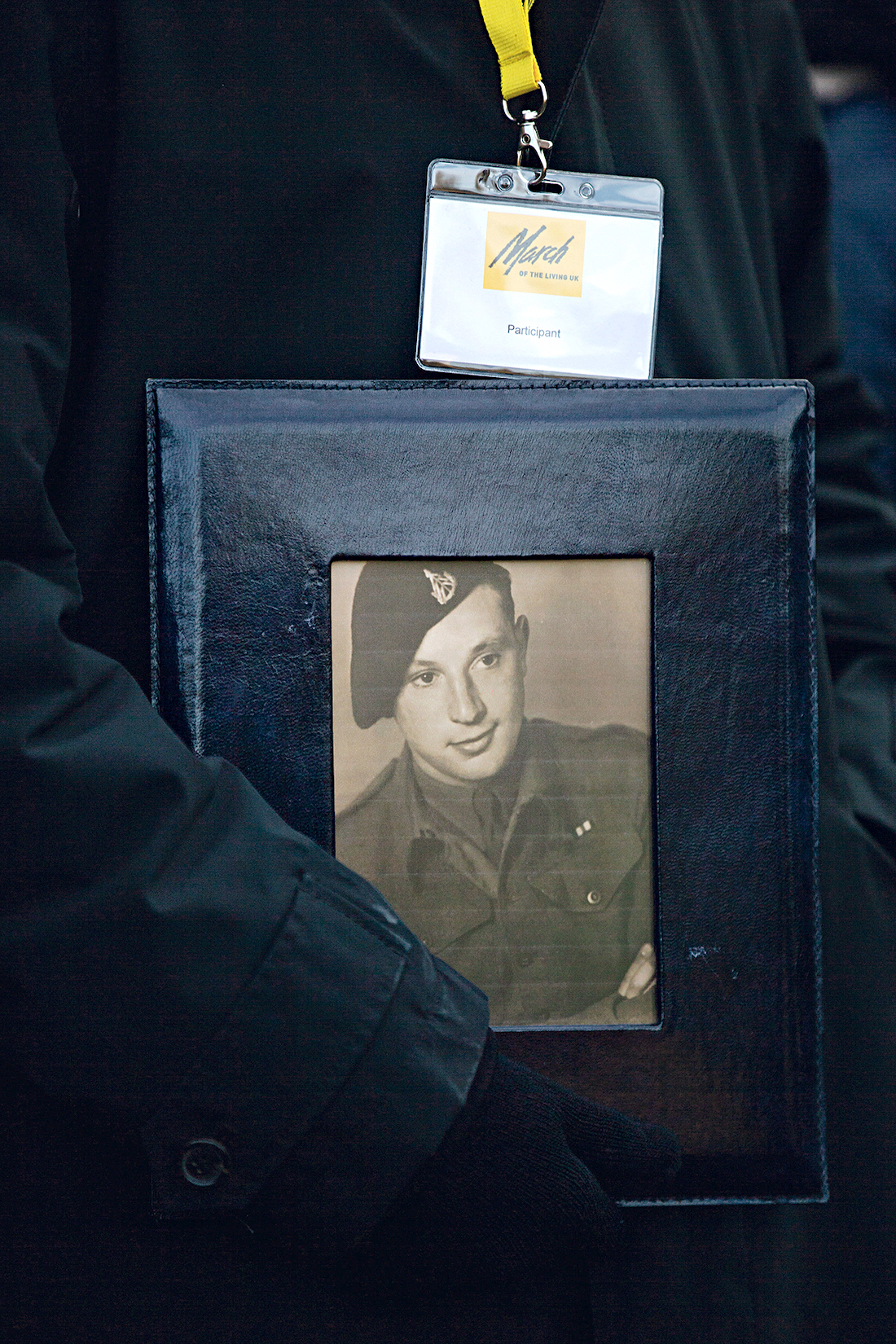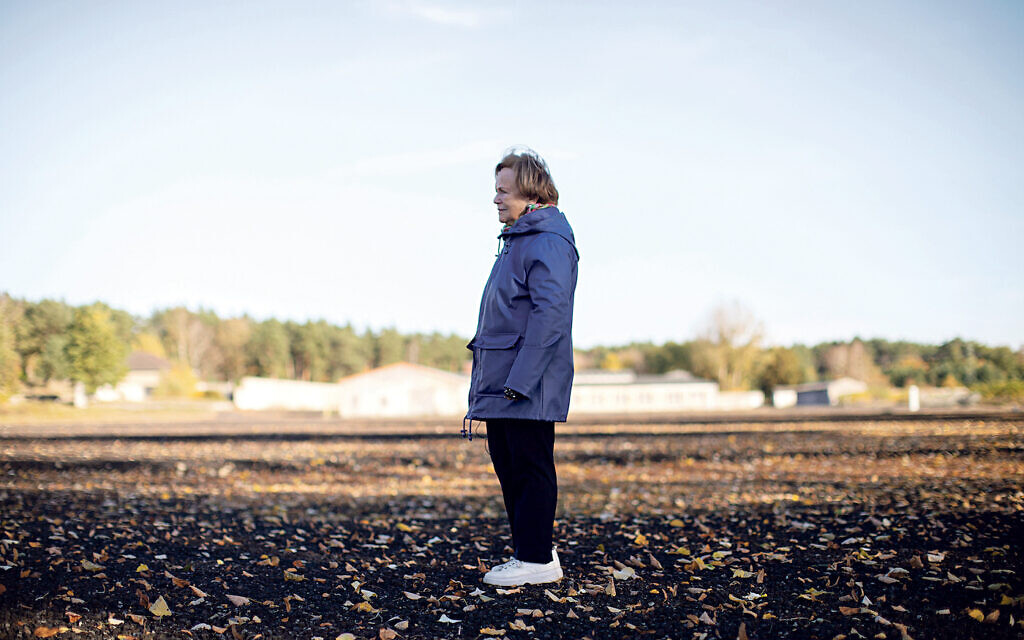At Ravensbruck, Mala Tribich’s moment was for all of us
"I feel like I have completed the circle by coming back to this terrible place and remembering the victims. If we don't keep the memory going, they will be forgotten, and if they are forgotten, it will be as if they never existed"
Often, it is the small things that are almost missed that matter most. They can be moments, and may neither define nor symbolise an occasion, an event, but despite their fleeting nature they are of the utmost importance.
This was true on Sunday’s much-mooted first return to Ravensbrück concentration camp of 91-year-old former detainee Mala Tribich, one of Britain’s best known survivors and sister of Sir Ben Helfgott. The thing that mattered most was a moment and when it came, it came in private.
In public were 80 participants on the inaugural March of the Living (MOTL) Germany trip, stood amid the remnants of a still-too-recent evil. For them any moment of definition or symbolism would have sufficed. To begin to understand mass murder on a camp visit is to be doing well. Most don’t. Most never will. That’s the point.
Get The Jewish News Daily Edition by email and never miss our top stories Free Sign Up
It is 2021. Due to their advanced age and the difficulties this poses for travel, it is now extremely rare for a survivor to undertake a first visit to a camp from which they survived. Put simply, if they haven’t been by now, it’s highly unlikely that they will go.
Yet in their planning for Germany – new territory for the until-now Poland-based MOTL – organisers asked Mala if she wanted to go. “Yes.” Oh, OK… why, might they ask, had she not been before? No-one had invited her. Sometimes, it’s that simple.

The real salience of Mala being here was felt not when she first walked through the gates of Ravensbrück, nor even when she lit three candles – one for her aunt, one for her best friend, and one for the other 50,000 who died here – after offering her testimony to the MOTL group.
It wasn’t in the heavy silence of prayer, in a group both bonded and bounded by this brave woman’s story, stood under shedding trees in a crisp autumn stillness 60 miles north of Berlin, despite the scene being set: a nose wiped, from emotion or cold, or both; a camera clicks; warm late-day sun filing through trees and warming the shoulders of the back row; bobbles on hats quivering in the breeze; a dropping pin clattering riotously, or at least, it may as well do.
Treated like an A-lister, there is no Hollywood score to Mala’s return, no soaring strings crescendo, only a wind that whistles its presence through the top of a microphone and a man zipping his coat up further, up to his chin, while a technician checks a cable and a film crew check their angles. Hands rub. Feet stomp. It’s cold, but that’s not what people here are thinking about. For once, the chill is no hardship whatsoever.

Mala takes a tissue to her face. The group inhales sharply, collectively, instinctively. Is this it? Is this where she cries? She doesn’t, but it’s not for the lack of 80 people thinking at once and in synch: “It’s OK if you do.”
The significance does not jump out as she walks the grounds – mostly wide and open spaces, with purposeful dead tree trunks, remains of walls, bits of tangled barbed wire, plaques, and pillars of information. Little remains of what once was.
Mala will say later that not much new came back to her, against expectations. She simply didn’t recognise Ravensbrück today. It was too different. “Was there always a lake there?” she asks innocently. “Yes”, says Dr Andrea Genest, director of Ravensbrück Memorial Museum, who is showing Mala the camp together with an educator called Tomas. “Oh… It’s beautiful. I never saw it.” Her eyes sadden, as she realises that she was denied beauty on the doorstep.

Tomas offers Mala a kindly German hand as they descend a slope, but she doesn’t take it. She’s fine, thank you very much. He shows her the Nazis’ arrival records, including her own. She asks for those of friends, family, people from her village, spelling surnames. He fumbles. He’ll have to get back to her. This bit is for Mala to ask questions, but soon she’s educating the educators.
“You slept two to a bed, yar?” No, four. She remembers because there were two extra feet with which she may now be kicked. “You spent half the day outside, yar?” No, most of it. She remembers because it was a cold from which you couldn’t warm.
Post-tour, she is asked to walk alone through a line of trees by her friend Sam, the talented photographer, so he can capture her pensive reflection for our newspaper. A spritely 91-year-old, all of five-foot-nothing, Mala can shift. On the whistle, she’s off in a puff of dust, sending Sam scampering. It’s the brisk no-one’s-stopping-me walk of a free woman defying both age and former captors. It’s not easy being here. She’ll show it with her heels.
Walking, and walking independently, seems to mean more to her here, but I don’t know why. The next day, at Bergen-Belsen, there’s a clue. She recalls to the same MOTL group how she insisted on walking out of that hell-hole from her sick bed upon liberation in April 1945, despite having typhus. “I got up and promptly collapsed,” she says, still a hint of annoyance that she couldn’t do it. “They scooped me up, put me on a stretcher, and carried me off, but I think it shows my determination.” She looks down at the ground, as if that’s where the memory is, or the answer. Yet more cameras click.
A transcendental moment in private might have come in a minute of quiet solitude at Ravensbrück, had she had any. As one such moment threatens, an Israeli journalist with a thick American accent pounces. “Hey Ma-La, does any of this jog any memories?” He waves his hand in the general direction of the camp. “No? Well, how’s about these photos?” He points to a pillar, complete with black-and-white images. “How’s about now?” Heavy on the crass, light on the class, she gives him the answer he deserves: “No, sorry.” He later bemoans not having got “any colour for the Mala bit”. I commiserate. “Did you?” he asks. “No, sorry.”

He’ll have to make do with the public offering: camp vignettes, rehearsed snippets of hell, for which she removes herself just enough to be able to tell the group whatever horror she remembers. Today, with a tired blush, she recalls “being looked at naked by male [German] soldiers”. Yes, she is describing men with guns shepherding naked women and girls in a women-only camp. She was 14 and had never been naked around a man before. “I’ll never forget it,” she says in shame, not anger. In general, there is no anger, which is a surprise. Her voice only betrays intemperance when describing how the shoddy threadbare inmates’ clothing was called “a uniform”. Why so angry? “For giving it a respectable name.”
Stripped of their clothing and dignity, their heads are shaved, their names become numbers, and this laughable striped “uniform” is handed out. They all look the same. It is its own horror to be stripped of your personality and identity, she explains, carrying a look that says she doubts we’ll ever understand, a point on which she is almost certainly right.
“Without hope, there is no survival,” she says from a position of authority vanishingly few can claim. How lucky, I keep thinking, that so many young MOTL participants were here – at this camp, in 2021, with a survivor from it. This is something that they will tell their own grandchildren one day: that time they went to Ravensbrück with Mala.
I feel like I have completed the circle by coming back to this terrible place and remembering the victims. If we don’t keep the memory going, they will be forgotten, and if they are forgotten, it will be as if they never existed
She says how her aunt and best friend died here. “I always use their names because they were numbers at the time.” She goes on explaining, answering, sometimes from participants’ questions, more often from those pointing a lens to her face, a furry boom to her mouth. She’s used to it. She’s done the schools. She can even tell them when her mic isn’t fitted properly.
It was an enormous responsibility, she says, to look after her seven-year-old cousin Ann (Hana in Polish). Earlier, on the coach, she whispered to me how it had been a source of frustration, too. “I mean, I was 14. But I suppose it’s not like you have too many secrets in a camp.” Hana, whose life she saved, was always there, ever-present, not letting a 14-year-old be a 14-year-old. It’s very human – a teen who only wanted space for secrets and didn’t get any.
The horror was punctuated by the odd yet memorable act of kindness, she recalls. A ladler of jelly who gave her extra owing to her grandparents’ birthplace. An SS boss who smiled at her chutzpah and told a guard to do as she asked. Other acts were less kind. An inmate who stole her last morsel of bread as she slept. “There were good and bad there,” she says. Seems you’re still “bad” if you’re desperate and dying.
Back to the MOTL. A man at the back hoists an Israeli flag. Survivors sit on deckchairs. Those at the front raise their mobiles to film and photo. Earlier Mala had said privately: “I can hardly bear it, even though I’m here, on the spot.” Now, in front of many, she steps up, chin up. “This really got to me after all these years,” she says. “I am deeply, deeply emotional.” Yet the voice doesn’t break. Tears don’t flow. Words don’t hesitate. Eyes stay strong. She both looks, and doesn’t look, “deeply emotional”. Which brings us to the moment that mattered.
It occurred on one of the two MOTL coaches, just minutes after we pulled into Ravensbrück, after the participants had got off and filed away with their guides. Mala had remained on the coach, together with MOTL UK chief executive Cassie Matus, and me. She was looking out of the window at the big Ravensbrück sign when it hit her. We were where she’d finally lost hope of living, where her identity had been taken, where she’d lost both a loving aunt and a dear friend in a matter of days. And with that, she shed a tear.
Those who know Mala Tribich, who’ve known her for years, like Sam, will tell you that this just isn’t what she does, ever. Mala herself will concur. “This is the most emotional I’ve ever seen you,” Sam says later in the softest of voices, an intonational arm wrapped around her. “I know,” she says. “I was surprised by my reaction. I don’t like showing it. I usually keep my emotions in check. I don’t cry normally. Well, not with tears. This is the most upset I’ve been.”
Andrea and Tomas board the bus soon after to meet Mala for the first time. Andrea is so overcome that she cannot finish introducing herself. Behind the mask, a lip inadvertently kinetic. But by now Mala’s tear is long gone, wiped away, and she is back in presentation mode. Best face forward. So, soon, will Andrea be. Lights. Camera. Action.
Are you pleased you came back? That’s what people ask her. “Yes,” she says, after an initial pause. “I feel like I have completed the circle by coming back to this terrible place and remembering the victims. If we don’t keep the memory going, they will be forgotten, and if they are forgotten, it will be as if they never existed.”
We leave. Some will say hers was but the tear of an old woman, that it weighs what it weighs. They’re idiots. It weighs the weight of an ocean, conveys more than a library, because that tear fell here, from someone imprisoned here, who survived here, and who came back here to cry for those who never left.
It is both her tear, their tear, and ours, shed for the children and grandchildren who never were, because here Jews came up against systematised mechanised prejudice and stood no chance. Her tear defies hatred for all of us.
Her visit to Ravensbruck in 2021 with MOTL will not only reverberate on through the years ahead, but back, back, all the way to 1944. Evil must be faced down, yet few can, and even fewer do. Shedding a tear neither defines this camp of horrors nor symbolises it, but still trumps everything else for importance and meaning.
Never again, one suspects, will Mala return here. Back on the bus, her truest thoughts she keeps to herself.

Thank you for helping to make Jewish News the leading source of news and opinion for the UK Jewish community. Today we're asking for your invaluable help to continue putting our community first in everything we do.
For as little as £5 a month you can help sustain the vital work we do in celebrating and standing up for Jewish life in Britain.
Jewish News holds our community together and keeps us connected. Like a synagogue, it’s where people turn to feel part of something bigger. It also proudly shows the rest of Britain the vibrancy and rich culture of modern Jewish life.
You can make a quick and easy one-off or monthly contribution of £5, £10, £20 or any other sum you’re comfortable with.
100% of your donation will help us continue celebrating our community, in all its dynamic diversity...
Engaging
Being a community platform means so much more than producing a newspaper and website. One of our proudest roles is media partnering with our invaluable charities to amplify the outstanding work they do to help us all.
Celebrating
There’s no shortage of oys in the world but Jewish News takes every opportunity to celebrate the joys too, through projects like Night of Heroes, 40 Under 40 and other compelling countdowns that make the community kvell with pride.
Pioneering
In the first collaboration between media outlets from different faiths, Jewish News worked with British Muslim TV and Church Times to produce a list of young activists leading the way on interfaith understanding.
Campaigning
Royal Mail issued a stamp honouring Holocaust hero Sir Nicholas Winton after a Jewish News campaign attracted more than 100,000 backers. Jewish Newsalso produces special editions of the paper highlighting pressing issues including mental health and Holocaust remembrance.
Easy access
In an age when news is readily accessible, Jewish News provides high-quality content free online and offline, removing any financial barriers to connecting people.
Voice of our community to wider society
The Jewish News team regularly appears on TV, radio and on the pages of the national press to comment on stories about the Jewish community. Easy access to the paper on the streets of London also means Jewish News provides an invaluable window into the community for the country at large.
We hope you agree all this is worth preserving.
-
By Laurent Vaughan - Senior Associate (Bishop & Sewell Solicitors)
-
By Laurent Vaughan - Senior Associate (Bishop & Sewell Solicitors)
-
By Laurent Vaughan - Senior Associate (Bishop & Sewell Solicitors)
-
By Laurent Vaughan - Senior Associate (Bishop & Sewell Solicitors)






















